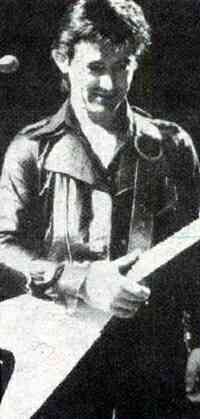|
When Chris Spedding moved to America at the end of 1978 he had a year's contract to play with Robert Gordon. While in New York he began sitting in on rehearsals with a local band the Necessaries. And when his contract with Gordon was finished he joined the group. It was a surprise move.
 Spedding has often been dismissed as a mercenary who'll sell his talents to the highest bidder. But here he was, joining a young, relatively unknown band. Yet it seems to be a happy alliance ... a solution to Spedding's problem as a musician who's too talented to be a sideman, but doesn't have the right personality for a solo performer.
Spedding has often been dismissed as a mercenary who'll sell his talents to the highest bidder. But here he was, joining a young, relatively unknown band. Yet it seems to be a happy alliance ... a solution to Spedding's problem as a musician who's too talented to be a sideman, but doesn't have the right personality for a solo performer.
In the Necessaries, Spedding shares the lead vocal with Ed Thomney, who has a New Jersey street kid's swagger on stage, and a rather shy and gentle manner offstage. Thomney formed the band a year ago, with Jessie Chamberlain on drums and Ernie Brooks on bass.
Brooks once in the Modern Lovers, but left when Jonathan Richman's eccentricities became too demanding.
"I'm still friends with Jonathan," said Brooks, "but his ideas of what the music should be changed so fast that it was impossible to keep up.
"At one point he decided that electricity was the work of the devil - that's why he insisted on switching to acoustic guitars."
Chamberlain has the more surprising background. Four years ago, when he was 17, he became vaguely involved with the Art Language movement, and eventually linked up with Mayo Thompson to form the Red Crayola. They played together for a year in England and made an album, "Soldier Talk".
Says Chamberlain:"Mayo taught me a lot as far as 'just play - anything works in music, anything goes'. We had a great time, but as far as politics, I couldn't understand a lot of what he was talking about. Mayo had a grudge against the world. He was kind of an angry young man. I looked at it from a musical point of view - I got to play angry young man lyrics."
(Spedding looked at Chamberlain in surprise. "I never knew you'd done any of that!" Chamberlain shrugged. "I didn't think you'd be interested.")
Spedding now writes about half the Necessaries' songs; the others are by Ed Thomney, who describes lyrics as indirectly political. Thomney says that when he's looking for inspiration he takes a walk down Wall Street.
"We just state the facts about life in America," explains Chamberlain. "Like the Clash did about England, but we're not so heavy about it."
The groups is advertised simply as "The Necessaries".
Spedding says: "I don't want my name to be used, otherwise people will just expect me to play my solo stuff and they'd be quite justified in asking for their money back if they don't hear it."
He also refused to be interviewed separately from the rest of the group.
In fact, Spedding hates interviews, and he recently put his opinions into a song called "Musical Press". He suggested, helpfully, that a paper like this one would be much improved if it was made up of photographs with witty captions ... and no text.
Spedding, says he's bored with London and has no desire to return; there's more money and more freedom in New York, he says, and he likes the way staying up all night there is considered the right and normal way to live.
All the Necessaries have mixed feelings about the New York music scene. The group has no niche, and doesn't fit in anyweher, says Chamberlain. But for Spedding, the outsider, it means he's got company.
"I never fit in here, so we've got that in common, I guess."
|
 Spedding has often been dismissed as a mercenary who'll sell his talents to the highest bidder. But here he was, joining a young, relatively unknown band. Yet it seems to be a happy alliance ... a solution to Spedding's problem as a musician who's too talented to be a sideman, but doesn't have the right personality for a solo performer.
Spedding has often been dismissed as a mercenary who'll sell his talents to the highest bidder. But here he was, joining a young, relatively unknown band. Yet it seems to be a happy alliance ... a solution to Spedding's problem as a musician who's too talented to be a sideman, but doesn't have the right personality for a solo performer.